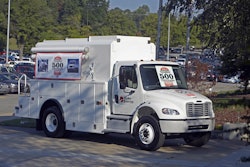
In testimony before the House Transportation and Infrastructure Subcommittee on Highways and Transit, the American Trucking Associations on Thursday, Sept. 13, again called for changes to make the Federal Motor Carrier Safety Administration’s Compliance Safety Accountability program better able to achieve its stated goals.
“ATA has been supportive of the objective of CSA – to reduce commercial motor vehicle crashes, injuries and fatalities – since the program’s inception,” testified Scott Mugno, vice president of safety for FedEx Ground Package System. “However, ATA has significant concerns with the program in its current form.”
Mugno cited issues in data weakness that prevent FMCSA from having enough information to evaluate carriers properly – as well as methodology issues that count all crashes, regardless of preventability, against a carrier – as among the most significant issues with CSA. Mugno said that while ATA continues to support CSA’s stated goal, FMCSA needs to take several steps to fix the program.
“First, FMCSA must acknowledge that CSA scores are often not a reliable predictor of future crash risk,” he said. “Second, the agency must confirm that CSA’s highest priority should be to focus on the least safe carriers. And finally, FMCSA must establish a specific plan to develop and implement the changes necessary to ensure that the system functions as intended.”
CSA scores hurt trucking companies with good operating histories, lawmakers said, citing complaints they’ve received from fleets. Brokers, shippers and insurers are less likely to do business with carriers with bad scores even if they’re based on paperwork violations, they said.
“While the old adage of ‘garbage in, garbage out’ does not completely apply here, there are questions about the reliability and integrity of the data,” said U.S. Rep. Nick Rahall (D-W.Va.).
CSA data and ratings have been validated by the University of Michigan’s Transportation Research Institute, said FMCSA Administrator Anne Ferro. Carriers with the worst scores have crash rates that double those of the average company, Ferro said.









